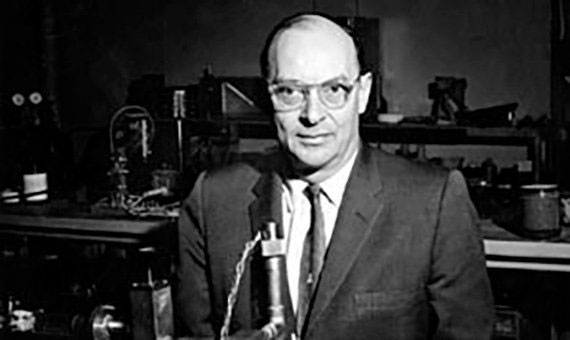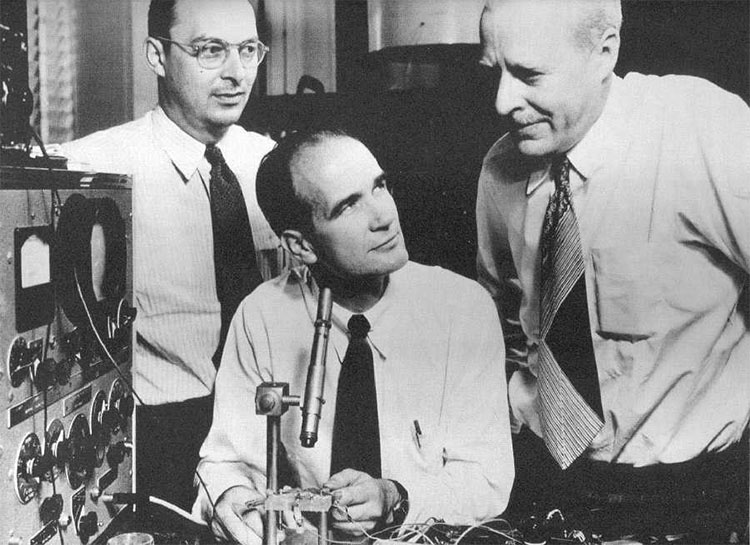The only scientist twice won the Nobel Prize in Physics
John Bardeen revealed his gift from a young age and contributed to the revolution in electronic technology with excellent research.
The Nobel Prize for Physics was born in 1901 and has been awarded 112 times to 210 scholars and research groups around the world, according to the Nobel Prize. In it, the only person who received this prestigious award twice was John Bardeen.

John Bardeen received the Nobel Prize in Physics in 1956 and 1972. (Photo: Nobel Prize).
Bardeen was born on May 23, 1908 in a family in Madison, Wisconsin, USA. His father, Dr. Charles R. Bardeen, head of the Medical Department at the University of Wisconsin. Bardeen revealed his intelligence early on and was educated by his parents from third grade to middle school. He enrolled at the University of Wisconsin at the age of 15 and by engineering, then received a master's degree.
Bardeen graduated from university in the period of great economic recession, jobs were scarce. He became a geophysicist working at the research lab of Gulf Oil. After three years, Bardeen realized that this was not his passion. He left and studied at Princeton University and received his doctorate in mathematical physics.

John Bardeen in the process of working at Bell Laboratories.(Photo: Open Mind).
At Princeton, Bardeen began to study metal under the guidance of Professor EP Wigner, using new quantum mechanical theories to better understand semiconductors. He completed his thesis in 1935 and was nominated for a position at Harvard University. He worked here for three years. At the same time, he married a biologist Jane Maxwell and later had three children.
In 1945, when World War II ended, Bardeen worked at Bell Laboratories. He further studied semiconductors, especially the movement of electrons. Two years later, he and physicist William Shockley and Walter Brattain introduced the transistor, or transistor, for the first time to the world. This invention began a revolution in electronics.
In addition to replacing bulky vacuum lamps, transistors also help to shrink the parts needed to develop computers. This achievement helped Barden and his two colleagues win the first Nobel Prize in 1956.
"We are fortunate to be present in a particularly appropriate period to add a small step to the process of natural control for the benefit of mankind," he said after receiving the award.

Three scientists received the 1956 Nobel Prize in Physics for their study of transistors.(Photo: Senior Tech Group).
Bardeen returned with previous research on superconductivity. This study helps explain that resistance disappears when materials reach temperatures near absolute zero. His work with physicist Leon Neil Cooper and John Robert Schrieffer helped build BCS theory of superconductivity. BCS became the fundamental theory for later superconducting studies. It also brought to three scientists the Nobel Prize in Physics in 1972.
John Bardeen was one of the most influential and most influential scientists of that period. He is a member of the American Physical Society (APS) as well as the US President's Scientific Advisory Committee. He was elected to the US National Academy of Sciences in 1954 and was awarded the Buckley Prize of APS in 1955, the London Fritz Prize for the study of low temperature physics in 1962.
Bardeen died on January 30, 1991 due to heart disease, shortly after the final study was published in Physics Today in December 1990."Very few people have an impact on the entire 20th century bigger than he is," said Dr. Robert M. Berdahl at the University of Illinois.
- Why are Nobel Prize recipients getting older?
- Japanese scientist won the 2014 Nobel Prize in Physics
- The invention of laser won the Nobel Prize in Physics 2018
- Nobel history and things to know
- Gravitational wave discovery work won the 2017 Nobel Prize in Physics
- Wikipedia's Nobel laureate refused to set up a site because it was not popular
- Two scientists won the Nobel Prize to Vietnam
- 2016 Nobel Prize in Physics and the mystery of strange materials
- The Nobel Prize is not in the Nobel's 'vision'
- Three light experts won the Nobel Prize in Physics
- Inventing CCD won the 2009 Nobel Prize in Physics
- Nobel Physics for the invention of disc reading technology
 The most famous scientific failures in history
The most famous scientific failures in history Mysterious genius mechanic and the machine froze time
Mysterious genius mechanic and the machine froze time The son carries the 'bad gene' of genius Albert Einstein
The son carries the 'bad gene' of genius Albert Einstein Isaac Newton
Isaac Newton